Maggie Stiefvater's Blog: Maggie Stiefvater, page 388
December 30, 2011
A Not Illustrated Guide to UK Touring, Days 7-13
My. My. My. The holidays are finally over. I know you're thinking: oh ho, no they aren't, Maggie Stiefvater, there's still New Year's. But as I neither drink nor enjoy sleep deprivation, I can assure you that the end of the year will find me watching reruns of either Scrubs or the Big Bang Theory and then going to bed at an hour reasonable to humans. I have other vices, and they are not contained to any one particular day of the year.
Anyway, I am now going to wrap up my UK touring posts. I've been putting this one off as it requires a bit of assembly of the not-illustrated variety. See, after an assortment of school visits and travel in the middle of my UK tour, we finished with a rather impressive pair of events. One in Liverpool (which looks like Liverpool, if you've ever wondered) and one in London, with the assistance of Jonas & Plunkett. Blog readers will recall that Jonas & Plunkett are one of the bands I adore and also that they did a cover of Sam's "Summer Girl" from Shiver. I was revoltingly pleased when they agreed to play both "Summer Girl" and my personal favorite, "Spaceship," for the London event. In all honesty, I do have to admit that Adrian Plunkett did ask me to sing along with them. And I did write harmonies in my hotel room. But in the end, I did what happens whenever anyone asks me to sing in public. Here are the videos for those who couldn't be there (thank you, lovely reader, for video'ing these two songs)!
Sorry, Plunkett. I did actually think I would overcome my dislike of singing in public, but it turns out I'm still more comfortable playing my bagpipes for the entire planet than crooning for a roomful of readers. Rematch? With a harp or piano next time? (Also, for those of you who haven't heard the rest of their incredible music, it's all available on iTunes and you can listen to the studio version of Summer Girl here).
After these final events, the most perfect any author could ask for, I had a few days off to pursue research for MagicalNovel. I met up with my great (and musical) friend Erin Hill and she, my mother, my sister and I
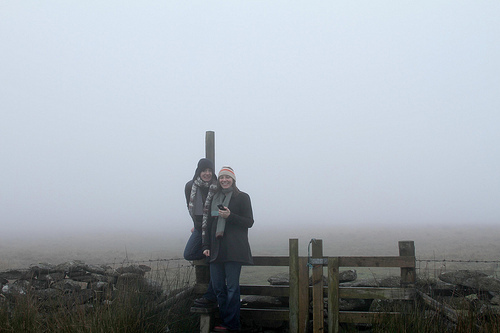
got lost on the moor (for an hour)
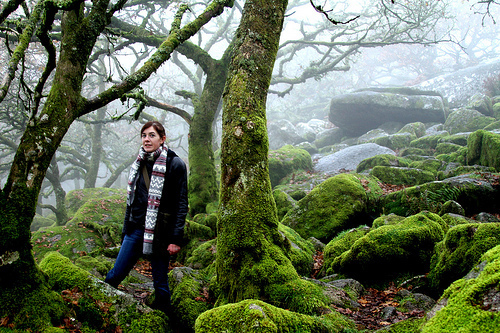
went to Wistman's Wood (which looked like a lost 80s fantasy movie set)
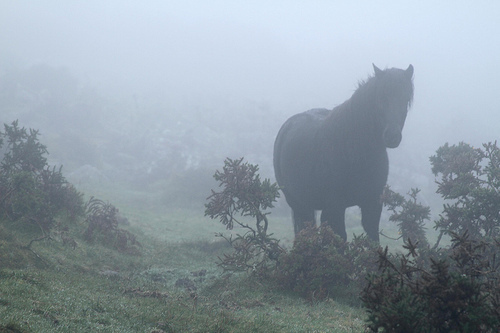
Found wild ponies! (or maybe they found us)

climbed Glastonbury Tor (crawled Glastonbury Tor)
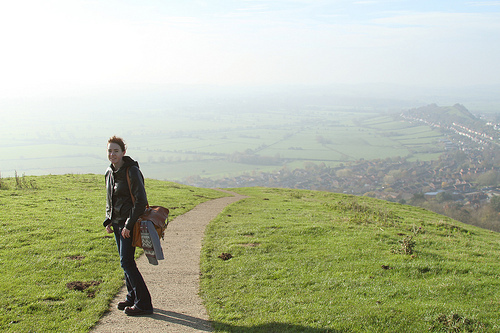
Saw the whole world (or at least the pretty parts)

Found this crazy Bough House made by a guy in Dartmoor and had it shipped home for Things 1 & 2 for Christmas.

(no, seriously, is it not the coolest thing ever? that came in a crate bigger than my car?)
And thus ended my touring for the year. A perfect ending, and as always, I can't wait to go back to the UK. Thank you to all of my readers for reading my books all over the world!
Anyway, I am now going to wrap up my UK touring posts. I've been putting this one off as it requires a bit of assembly of the not-illustrated variety. See, after an assortment of school visits and travel in the middle of my UK tour, we finished with a rather impressive pair of events. One in Liverpool (which looks like Liverpool, if you've ever wondered) and one in London, with the assistance of Jonas & Plunkett. Blog readers will recall that Jonas & Plunkett are one of the bands I adore and also that they did a cover of Sam's "Summer Girl" from Shiver. I was revoltingly pleased when they agreed to play both "Summer Girl" and my personal favorite, "Spaceship," for the London event. In all honesty, I do have to admit that Adrian Plunkett did ask me to sing along with them. And I did write harmonies in my hotel room. But in the end, I did what happens whenever anyone asks me to sing in public. Here are the videos for those who couldn't be there (thank you, lovely reader, for video'ing these two songs)!
Sorry, Plunkett. I did actually think I would overcome my dislike of singing in public, but it turns out I'm still more comfortable playing my bagpipes for the entire planet than crooning for a roomful of readers. Rematch? With a harp or piano next time? (Also, for those of you who haven't heard the rest of their incredible music, it's all available on iTunes and you can listen to the studio version of Summer Girl here).
After these final events, the most perfect any author could ask for, I had a few days off to pursue research for MagicalNovel. I met up with my great (and musical) friend Erin Hill and she, my mother, my sister and I

got lost on the moor (for an hour)

went to Wistman's Wood (which looked like a lost 80s fantasy movie set)

Found wild ponies! (or maybe they found us)

climbed Glastonbury Tor (crawled Glastonbury Tor)

Saw the whole world (or at least the pretty parts)

Found this crazy Bough House made by a guy in Dartmoor and had it shipped home for Things 1 & 2 for Christmas.

(no, seriously, is it not the coolest thing ever? that came in a crate bigger than my car?)
And thus ended my touring for the year. A perfect ending, and as always, I can't wait to go back to the UK. Thank you to all of my readers for reading my books all over the world!
Published on December 30, 2011 09:38
December 22, 2011
Happy Holidays from YA Writers!
See if you can spot me in this video. Who knew YA authors had such . . . range?
(thanks to the delightful but possibly clinically insane Saundra Mitchell for organizing this.)
(thanks to the delightful but possibly clinically insane Saundra Mitchell for organizing this.)
Published on December 22, 2011 06:26
December 13, 2011
The Amazing Adventures of Kavalier & Clay
I'm just in the middle of reading Michael Chabon's The Amazing Adventures of Kavalier & Clay and chapter 8 is the most perfectly constructed chapter I have read in approximately 1,000 years.
Published on December 13, 2011 19:24
My Name is Maggie, I'm a Perfectionist, and I Never Stop Editing
And I think this is okay.
I know a lot of writing advice out there encourages you to kill your inner editor and let your work run free and to release mental possession of your draft. I know this advice is trying to battle the scores of writers out there who cling to their drafts, picking over them instead of working up the courage to send them out to critique partners, agents, and mothers. But I'm not sure I really like this condemnation of continual editing as a universal truth. For a beginning writer? Yes, I think there's some sense to it. You have to learn how to tell when a first draft is done. You have to learn how to give it away. But once you've finished a novel or two, I don't see why writers should be encouraged to think perfectionism is a dirty word. For me, "done" is such an intuitive thing. I can tell when my novels are done when they stop needling at me. When I stop thinking of things to do to them. When the characters are no longer acting out scenes in my dreams. It can't be about the fear that I haven't covered everything. It has to be that feeling that the movie in my head has reached the last reel. Until that happens, I edit and re-read and tweak and move one word three sentences down the page. Though a reader might not notice that you changed "cold" to "icy" on page 47, a word by word attack on a draft can change the subconscious effect of it on a reader.
So yes, I am an unrepentant fastidious editor.
I think this pretty much goes for every element of my life. So it should surprise no one when I say that I edited the recipe for November Cakes. A few months I posted about how I was delighted to have invented a food for THE SCORPIO RACES, and then I added a recipe. Well, it was still niggling at me. They were fine, but FINE IS NOT GOOD ENOUGH. I spent several months turning over possible solutions to my perceived unhappiness with my first November Cakes recipes, and then . . . I edited it.
Yesterday I tried out my fix. Of course it was hugely better. The cakey bit was fluffier, richer, more nuanced. The glaze was gooier and clung to the crevices of the cakes better. The entire consistency was improved. Now you bite through a caramel-honey glaze with a bit of resistance and into a fluffy, sweet dough beneath. That was what I was trying to do before.
I guess what I'm trying to say is that you shouldn't kill your inner editor. Just set up boundaries for her. Also, use this recipe and not the other.
*click for a bigger version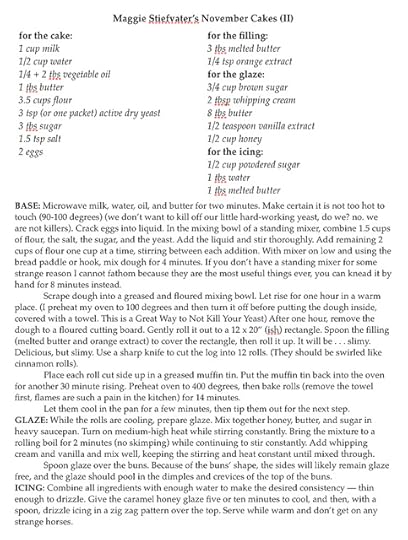


and, right out of the oven, while the glaze is still melty:

I know a lot of writing advice out there encourages you to kill your inner editor and let your work run free and to release mental possession of your draft. I know this advice is trying to battle the scores of writers out there who cling to their drafts, picking over them instead of working up the courage to send them out to critique partners, agents, and mothers. But I'm not sure I really like this condemnation of continual editing as a universal truth. For a beginning writer? Yes, I think there's some sense to it. You have to learn how to tell when a first draft is done. You have to learn how to give it away. But once you've finished a novel or two, I don't see why writers should be encouraged to think perfectionism is a dirty word. For me, "done" is such an intuitive thing. I can tell when my novels are done when they stop needling at me. When I stop thinking of things to do to them. When the characters are no longer acting out scenes in my dreams. It can't be about the fear that I haven't covered everything. It has to be that feeling that the movie in my head has reached the last reel. Until that happens, I edit and re-read and tweak and move one word three sentences down the page. Though a reader might not notice that you changed "cold" to "icy" on page 47, a word by word attack on a draft can change the subconscious effect of it on a reader.
So yes, I am an unrepentant fastidious editor.
I think this pretty much goes for every element of my life. So it should surprise no one when I say that I edited the recipe for November Cakes. A few months I posted about how I was delighted to have invented a food for THE SCORPIO RACES, and then I added a recipe. Well, it was still niggling at me. They were fine, but FINE IS NOT GOOD ENOUGH. I spent several months turning over possible solutions to my perceived unhappiness with my first November Cakes recipes, and then . . . I edited it.
Yesterday I tried out my fix. Of course it was hugely better. The cakey bit was fluffier, richer, more nuanced. The glaze was gooier and clung to the crevices of the cakes better. The entire consistency was improved. Now you bite through a caramel-honey glaze with a bit of resistance and into a fluffy, sweet dough beneath. That was what I was trying to do before.
I guess what I'm trying to say is that you shouldn't kill your inner editor. Just set up boundaries for her. Also, use this recipe and not the other.
*click for a bigger version



and, right out of the oven, while the glaze is still melty:

Published on December 13, 2011 06:15
December 8, 2011
Audiobook Winners!
Because I lack the ability to choose only one winner, and because I have my blog split over both Livejournal and Blogger, I picked two random winners:
Colleen from Blogger
and
Oh she speaks from LJ.
Both of you please shoot me an e-mail with your mailing addresses.
Thank you everyone for giving it a listen and also for giving me your thoughts on the narrators and on audiobooks!
Colleen from Blogger
and
Oh she speaks from LJ.
Both of you please shoot me an e-mail with your mailing addresses.
Thank you everyone for giving it a listen and also for giving me your thoughts on the narrators and on audiobooks!
Published on December 08, 2011 10:44
December 7, 2011
The Scorpio Races Audiobook Sampler
I am deeply in love with the audiobook version of The Scorpio Races. I am a little biased, since I got to pick the audiobook narrators (Steve West & Fiona Hardingham) for Sean & Puck, but still, I think it even the unbiased would find it CLEARLY WONDERFUL. However, it's hard to explain this to people without examples.
Well. Here is are examples.
CLEARLY WONDERFUL, yes? What do you think? I'm especially interested to hear from the folks that are non-habitual audiobook listeners. Does this tantalize you, or does it leave you wishing for the printed page?
I just started reading THE GIRL WHO CIRCUMNAVIGATED FAIRYLAND IN A SHIP OF HER OWN MAKING and for perhaps the fifth or sixth time in my life, I have found myself wishing that I had it in audiobook format, because it seems like a sort of story I'd like told to me. Just the way the words look on the paper look like they'd be be better out loud. And I wonder about SCORPIO's translation from print to audio, because I frequently read sections out loud while writing in order to make sure I had them the way I liked them. So I wonder if/ how that affects the reader/ listener experience. Personally, I have a hard time listening to actiony books in audio, because I'm a much faster reader than I am listener, and when someone's going to die, darn it, I want to find out how much blood there's going to be. STAT. But when the prose is nice or when it is a fairytale sort of story, I think I'm getting won over to audio.
Thoughts?
I reckon, since I have an extra copy of the audiobook in my office, that I'll randomly pick one of the blog commenters to bestow a copy of THE SCORPIO RACES audiobook on. (I officially just rewrote that sentence three times, with three different verbs, in an attempt to not finish it on a preposition). I'll pick one this time tomorrow (the 8th).
(for those wondering you can find the audiobook here. and here. and here. and here.)
Well. Here is are examples.
CLEARLY WONDERFUL, yes? What do you think? I'm especially interested to hear from the folks that are non-habitual audiobook listeners. Does this tantalize you, or does it leave you wishing for the printed page?
I just started reading THE GIRL WHO CIRCUMNAVIGATED FAIRYLAND IN A SHIP OF HER OWN MAKING and for perhaps the fifth or sixth time in my life, I have found myself wishing that I had it in audiobook format, because it seems like a sort of story I'd like told to me. Just the way the words look on the paper look like they'd be be better out loud. And I wonder about SCORPIO's translation from print to audio, because I frequently read sections out loud while writing in order to make sure I had them the way I liked them. So I wonder if/ how that affects the reader/ listener experience. Personally, I have a hard time listening to actiony books in audio, because I'm a much faster reader than I am listener, and when someone's going to die, darn it, I want to find out how much blood there's going to be. STAT. But when the prose is nice or when it is a fairytale sort of story, I think I'm getting won over to audio.
Thoughts?
I reckon, since I have an extra copy of the audiobook in my office, that I'll randomly pick one of the blog commenters to bestow a copy of THE SCORPIO RACES audiobook on. (I officially just rewrote that sentence three times, with three different verbs, in an attempt to not finish it on a preposition). I'll pick one this time tomorrow (the 8th).
(for those wondering you can find the audiobook here. and here. and here. and here.)
Published on December 07, 2011 10:20
December 5, 2011
Five Things About THE NIGHT CIRCUS
 Ordinarily when I do my recommendations, I do a “five reasons to read _____,” but I think opinions will be so divided on THE NIGHT CIRCUS that I think “things about” will be more useful.
Ordinarily when I do my recommendations, I do a “five reasons to read _____,” but I think opinions will be so divided on THE NIGHT CIRCUS that I think “things about” will be more useful.1. This novel is not what it says it is. Well, back page copy is always a weird thing anyway, as it’s not written by the author. And a weirder thing because it is essentially a glamour shot of the novel. It is not a lie. But it isn’t really what the novel looks like when it’s wandering around in its bathrobe getting coffee and trying to figure out if that smell is coming from the kitchen sink disposal or under the table. The resemblance is always a bit sketchy. THE NIGHT CIRCUS’ resemblance to its cover copy is sketchier than most.
2. This novel is about a thing. It has people in it, too, but it is mostly about a thing, the eponymous circus. It’s told in third person omniscient, which means it sounds like God is narrating the thing, if God decided he really loved black and white tents and fancy umbrellas. The voice that narrates this book is interested in humans, too, but mostly about how humans make the circus and the circus’ magic interesting.
3. This is not a romance. There is a love story in it, which is good, because love makes the world go round, but it is not a romance. If you go in imagining to be swept off your feet from page one, you can keep on imagining. The novel starts before our lovebirds have hit puberty, so you’re going to have to imagine for quite awhile.
4. The circus is not really a circus. This is fine by me, because I actually don’t care for circuses. They smell, the animals always have that look of dubious maltreatment, no, I don’t want to win a prize by shooting that thing off that other thing over there, and also, clowns look a little grubby to me. No, the Night Circus is a circus in the respect that there are tents, and there are performers, and some of them are acrobats. Mostly it is a place where pretty, pretty magic is passed off as illusion so that us muggles won’t be scared by it. I’d go to that circus.
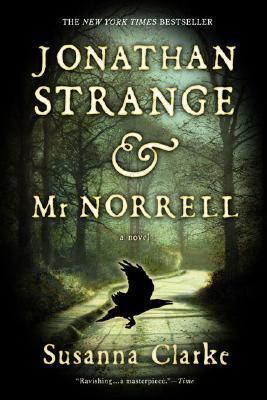
 5. This is not a thriller. This is a not an action-packed adventure. It’s not even a simmering revenge or bubbling rivalry novel. It is a novel about a thing, with love in it, and it spans over a decade. If you have a problem with that idea, it’s best you walk away now. But if you like Ann Patchett or Audrey Niffeneggar novels, or if you really thought JONATHAN STRANGE & MR. NORRELL was the bee’s knees, well. WELL. You have just found your next read. Enjoy. I did.
5. This is not a thriller. This is a not an action-packed adventure. It’s not even a simmering revenge or bubbling rivalry novel. It is a novel about a thing, with love in it, and it spans over a decade. If you have a problem with that idea, it’s best you walk away now. But if you like Ann Patchett or Audrey Niffeneggar novels, or if you really thought JONATHAN STRANGE & MR. NORRELL was the bee’s knees, well. WELL. You have just found your next read. Enjoy. I did.
Published on December 05, 2011 17:51
December 3, 2011
A Proper Education
Today, I'm going to answer a question I get asked a lot. Well, I'm going to combine a few variations of it into one blog post. This is the question(s):
1 - "Did you go to school for Creative Writing?"
2 - "Do you have to have a degree in writing to get published?"
3 - "Have you taken classes in writing?"
4 - "Will you be my mentor?"
First, the short versions.
1 - No. I was a history major.
2 - No. It's one way to get published, but not the only way. Not even the most common way.
3 - No. Well, not technically. More on that in a bit.
4 - No. But thanks for asking. I barely have enough time to make breakfast in the morning, but maybe this blog will count for something?
Now, the long version. No, I did not get a creative writing degree. I did try, once, to take a creative writing class at my college, but they told me my writing wasn't promising enough and turned me away. I wasn't crushed. I was a writer and I was going to learn how to write no matter what.
Yesterday, I was having my blood drawn for a physical, and the lady drawing my blood asked me about how I became a writer (because everyone enjoys a little career chit-chat as their life blood swirls into a collection of tubes). Did I go to school for it? Did I take classes? How did I know about the business? Was it anything like the X-Factor? As I tried to explain my process, she grew more convinced it was a happy accident and I realized that it sounded an awful lot like I just decided to become a writer and then got magically published in a cosmic lottery.
This, of course, does not happen.
And I think what I should have told her is this: You don't need a creative writing degree, but you do need a writing education.
These are not necessarily the same thing.
Warning: For a brief moment, I'm going to get on a soap box. I don't usually do that on the blog, especially when it's anything that can be construed as even vaguely political. I don't like pretending I know any better than anyone else how to solve the world's problems. I'm just a girl who eats cookies for breakfast and thinks a '73 Camaro is a perfectly reasonable business vehicle. However, when it comes to this topic, I think I'm qualified to talk about it.
The thing modern education has gotten really wrong is this: ignoring the fact that there are 4,000 ways to competency. 100,000 ways to competency. One million ways to competency. One of the dumbest things ever decided was that a piece of paper with a college name on it made one person's skill set better than someone else's.
That piece of paper often means something. But the lack of it often doesn't.
It's convenient to put your average muggle through four years of college and expect that they'll come out the other side equally educated in a specific field, ready to join the workforce. But if you take 50 teens who all want to be history majors, for instance, and put them through four years of college, at the end, you will not have fifty equally-educated graduates. Because some of them will be slackers. Some of them will be naturally talented teachers, but terrible at remembering dates. Some of them will excel at research, but only about 14th century Scotland. Some of them will be great public speakers, but terrible writers. Some of them will be have spent their childhood learning everything that college was going to teach them and will emerge no more clever or skilled than they were at the beginning.
And some people will skip college and go on to be more successful than any of those grads.
How? How!? My sister read and chatted with me about OUTLIERS: The Story of Success, by Malcolm Gladwell. In it, he talks about the 10,000 hour rule — he postulates that it takes 10,000 hours of practice to become an expert in any field. I think this is key. You need to learn everything you can about not only writing, but reading, and everything you can find out about the industry and business. I would say that 10,000 hours of writing sounds about right. But I think that there are lots of ways to accomplish those hours. You can self teach. You can apprentice. You can take classes. You can workshop. You can get a writing critique partner. You can steal someone else's brain. The only thing that is standard-issue about a writing education is that it must happen in order to be successful. If you want a piece of paper saying you did it, that's your business, but no one else's.
Here is my education. I found it this week while I was looking for my social security card. It was a folder of some of my writing from before the age of 17: each of those pieces of paper represents a novel I wrote back then. I spent several hours every
evening writing, and when I wasn't writing, I was reading, and when I wasn't reading, I was living — riding horses, showing dogs, having a band, making trouble. You have to have something to write about, after all.
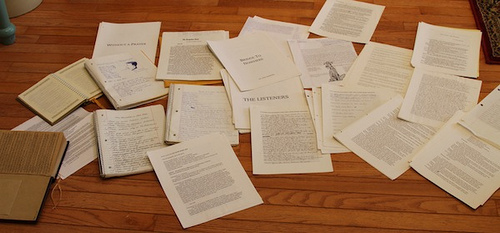
I reckon before I post this, I should emphasize that I have nothing against degrees in Creative Writing. If you think you need one to keep you motivated or to structure your education, go for it. But it's not the way I learn. And I'd wager in some cases it can do more harm to an introverted creative person's psyche than good. But the most important thing is: they're pretty much invisible when it comes to getting your book published. Your education, however you manage it, is the process: the book is the result. Agents, editors, readers: they don't care how you got there, just that you did.
1 - "Did you go to school for Creative Writing?"
2 - "Do you have to have a degree in writing to get published?"
3 - "Have you taken classes in writing?"
4 - "Will you be my mentor?"
First, the short versions.
1 - No. I was a history major.
2 - No. It's one way to get published, but not the only way. Not even the most common way.
3 - No. Well, not technically. More on that in a bit.
4 - No. But thanks for asking. I barely have enough time to make breakfast in the morning, but maybe this blog will count for something?
Now, the long version. No, I did not get a creative writing degree. I did try, once, to take a creative writing class at my college, but they told me my writing wasn't promising enough and turned me away. I wasn't crushed. I was a writer and I was going to learn how to write no matter what.
Yesterday, I was having my blood drawn for a physical, and the lady drawing my blood asked me about how I became a writer (because everyone enjoys a little career chit-chat as their life blood swirls into a collection of tubes). Did I go to school for it? Did I take classes? How did I know about the business? Was it anything like the X-Factor? As I tried to explain my process, she grew more convinced it was a happy accident and I realized that it sounded an awful lot like I just decided to become a writer and then got magically published in a cosmic lottery.
This, of course, does not happen.
And I think what I should have told her is this: You don't need a creative writing degree, but you do need a writing education.
These are not necessarily the same thing.
Warning: For a brief moment, I'm going to get on a soap box. I don't usually do that on the blog, especially when it's anything that can be construed as even vaguely political. I don't like pretending I know any better than anyone else how to solve the world's problems. I'm just a girl who eats cookies for breakfast and thinks a '73 Camaro is a perfectly reasonable business vehicle. However, when it comes to this topic, I think I'm qualified to talk about it.
The thing modern education has gotten really wrong is this: ignoring the fact that there are 4,000 ways to competency. 100,000 ways to competency. One million ways to competency. One of the dumbest things ever decided was that a piece of paper with a college name on it made one person's skill set better than someone else's.
That piece of paper often means something. But the lack of it often doesn't.
It's convenient to put your average muggle through four years of college and expect that they'll come out the other side equally educated in a specific field, ready to join the workforce. But if you take 50 teens who all want to be history majors, for instance, and put them through four years of college, at the end, you will not have fifty equally-educated graduates. Because some of them will be slackers. Some of them will be naturally talented teachers, but terrible at remembering dates. Some of them will excel at research, but only about 14th century Scotland. Some of them will be great public speakers, but terrible writers. Some of them will be have spent their childhood learning everything that college was going to teach them and will emerge no more clever or skilled than they were at the beginning.
And some people will skip college and go on to be more successful than any of those grads.
How? How!? My sister read and chatted with me about OUTLIERS: The Story of Success, by Malcolm Gladwell. In it, he talks about the 10,000 hour rule — he postulates that it takes 10,000 hours of practice to become an expert in any field. I think this is key. You need to learn everything you can about not only writing, but reading, and everything you can find out about the industry and business. I would say that 10,000 hours of writing sounds about right. But I think that there are lots of ways to accomplish those hours. You can self teach. You can apprentice. You can take classes. You can workshop. You can get a writing critique partner. You can steal someone else's brain. The only thing that is standard-issue about a writing education is that it must happen in order to be successful. If you want a piece of paper saying you did it, that's your business, but no one else's.
Here is my education. I found it this week while I was looking for my social security card. It was a folder of some of my writing from before the age of 17: each of those pieces of paper represents a novel I wrote back then. I spent several hours every
evening writing, and when I wasn't writing, I was reading, and when I wasn't reading, I was living — riding horses, showing dogs, having a band, making trouble. You have to have something to write about, after all.

I reckon before I post this, I should emphasize that I have nothing against degrees in Creative Writing. If you think you need one to keep you motivated or to structure your education, go for it. But it's not the way I learn. And I'd wager in some cases it can do more harm to an introverted creative person's psyche than good. But the most important thing is: they're pretty much invisible when it comes to getting your book published. Your education, however you manage it, is the process: the book is the result. Agents, editors, readers: they don't care how you got there, just that you did.
Published on December 03, 2011 08:25
November 29, 2011
An Illustrated Guide to UK Touring, Days 4-6
Earlier in the month, I posted about my first three days of touring (see here). Now I shall continue the story with the next three days, also known as: IN WHICH EVERYTHING IS ABOUT IRELAND, EVER.
See, on day 4, I once again took another train to Newcastle, where I had a school visit. I'd never been to Newcastle, and I was struck by two things: first of all, that their city center was beautiful, and secondly, when Newcastle school children say vowels out loud, they all sound like 'a' to my American ears. It resulted in the following conversations:
TEEN: Would you sign this post card?
ME: Sure. What's your name?
TEEN: Ashleigh.
ME: Spell it, please.
TEEN: A - S - H - L - A - A- A- THAT'S NOT HOW YOU SPELL MY NAME!
ME: Uh, write it, please.
Sorry, Newcastlians. I got the hang of it by the end, but I was pretty lame at the beginning.
Anyway, from Newcastle I flew to Belfast, Northern Ireland, for a librarian conference. By the time my Scholastic colleague, Hannah, and I, arrived at the Belfast airport, it was pitch black and sort of raining, but I had to be dragged off the tarmac in a state of shock. It's not that the Belfast Airport looks much different than other airports, it's just — when I was sixteen, there were two things I wanted more than anything. I wanted to be an author, as a career. I wanted to go to Belfast.
Standing there on that tarmac by the plane that had just brought me from Newcastle, I wished so much that I could tell 16-year-old Maggie that right before her 30th birthday, she'd be in Belfast because of her best-selling books. It would've meant a lot to her.
Maybe I did, and that's why I kept writing. Time travel is funny that way.
Anyway, so once I got over my shock and awe, we caught a cab from the airport. Our driver and I got to talking about life and Irish music and bagpipes, as you do, and then, this happened:
DRIVER: So I don't know if you ladies are in for the hunting, but it's lovely up here. I just got two pheasants today.
ME: Oh. Nice?
DRIVER: Yeah! I have them in the trunk now.
ME: the. . . trunk! Now? On . . . ice?
DRIVER: *ignores suggestion of ice*
ME: They're just laying there!?
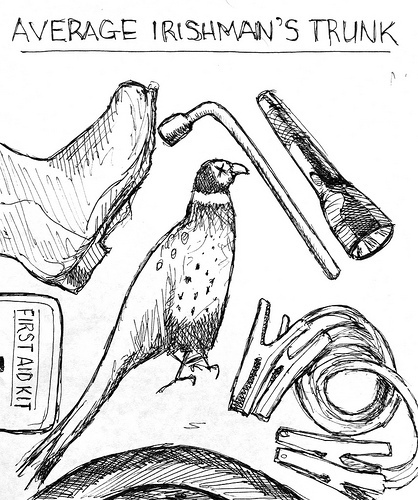
Yes. They were just laying there. The driver then explained to me that if he prepared the pheasants now, they would be "gamey." So his solution was to take them home (in the trunk of the car. Where they'd been all day.) and "hang them in the garage or someplace where people don't go often" until they stopped being so "gamey."
ME: How long will that be?
DRIVER: I dunno. Two weeks?
ME: on . . . ice?
DRIVER: *ignores suggestion of ice*
HANNAH: What about maggots?
DRIVER: You obviously work around the maggots.
At this point I decided that everything the man said was untrue and that we were being driven around by a crazy person. I didn't mind too much, because I was in Belfast, and also because I suspected if push came to shove, I was wearing better kicking shoes than Hannah and therefore she would be the first he stuffed into the trunk with the pheasants if the conversation went that way.
So the next day dawned misty and bleak, which was pretty much what I expected. We hitched a ride in a car without a parking brake to the school where the library conference was taking place, and then I proceeded to open up the conference with a talk about The Scorpio Races. I'll confess that I felt a little nervous about this. Not the talking itself, but the fact that I was now talking about my novel about Irish water horses while in Ireland. Despite the fact that my childhood looked like this:
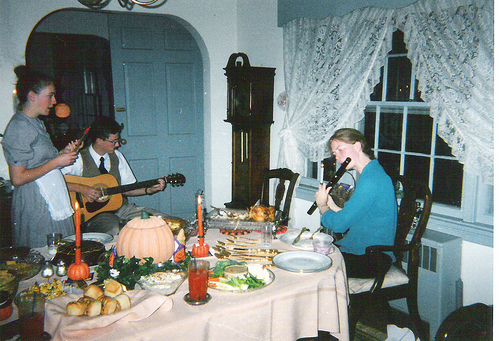
(halloween. I am dressed as a maid. I'm sure it was meant to be deeply ironic)
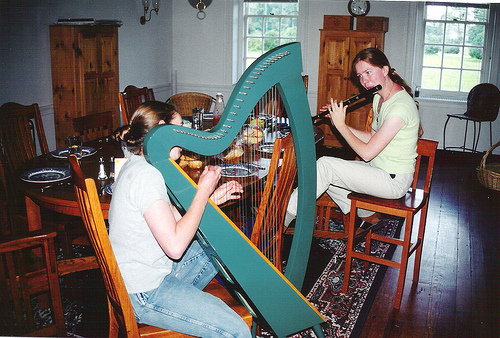
(continued bad hair, me with harp)
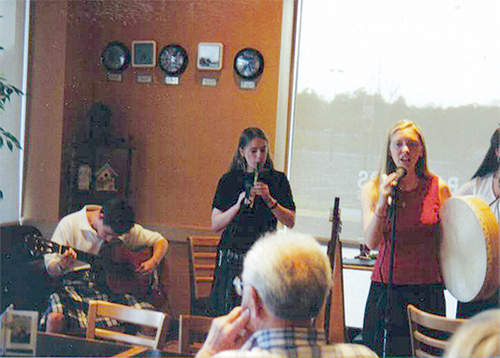
(me with my band)
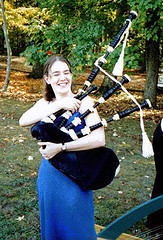
(I am both a wedding musician and a bridesmaid in this one)
. . . I still feel a little like a cuckoo when it comes to Irish music. Yes, we grew up playing and listening to Irish music, but it's not as if either Stiefvater or Hummel (my maiden name) are the most Irish of names out there. My family just loved the music and history and culture, and 29 years of describing why it was that I was not very Irish at all and yet played Irish music had made me defensive. Basically, I was waiting for the Northern Irish librarians to first shout PRETENDER! at me and then elaborate with a condemnation of how I had stomped in, all loud and American, and co-opted their mythology. But they didn't. They were brilliant. They told me my parents had raised me right and then they told me they'd read the book and loved it.
Phew.
Then, no rest for the wicked, so we were off in a car to Dublin in the Republic of Ireland (the lower 26 counties that are not part of the UK) for a bookstore event there. It rained and then was sunny and then was rainy and then sunny again, and by the time we got to Dublin, it was gorgeous.
I'm afraid that I had another wide-eyed staring uselessly moment when I discovered that I was looking at the General Post Office in Dublin. One of my senior theses was on the 1916 Irish uprising, and that was where it all started. I'd looked at so many pictures of it in my life, but there. it. was.
I was dragged gently to my bookstore event, then, where I struck up a conversation with the bookstore lads (one of whom I'd met before. one of whom I hadn't). The following conversation happened:
BOOK GUY: . . . and, like a pheasant —
ME: WAIT! WAIT. Talk to me about pheasants. Let's say you shot one. Then what?
BOOK GUY: Well, it's rather gamey at first.
ME: So I've heard.
BOOK GUY: So what you want to do is hang it up in your garage —
ME: No! NO. YOU'VE TALKED TO BELFAST DRIVER GUY, HAVEN'T YOU?
BOOK GUY: *pleasantly bewildered*
ME: Just because you don't believe in the principle of decay does not make it go away!
BOOK GUY: I'm telling you, it is totally edible.
At this point, I have decided that either all men in Ireland are out to have a laugh on my behalf, or possibly, decomposition doesn't happen in Ireland. I have now fixed an image in my head of the average Irish garage.
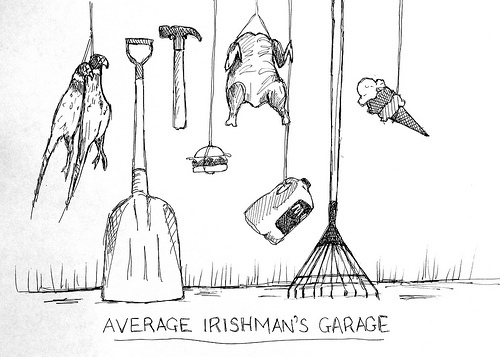
BOOK GUY: How do you make pheasants in the U.S.?
ME: We don't.
But apparently, we do. And apparently, we hang them up in our garages. (no, really.)
Anyway, after a delightful event in Dublin, we immediately got back on a plane that night to head back to London (I did say no rest for the wicked, didn't I?). The following morning we headed to the studio to do over a dozen radio interviews back to back.
No. rest. for. the. wicked.
It turned out that our friendly coordinator for all of these interviews was, in fact, Irish himself. We had the following conversation:
IRISH RADIO GUY: Where are you from in the States?
ME: Virginia.
IRG: No kidding! My father is a carpenter and he worked in Virginia for a few weeks. On a pub, actually, in Richmond, that was done with all Irish labor. About 10, 15 years ago.
ME: . . . Richmond? My band played for the opening of an Irish pub in Richmond. What was the name of it? Was it Siné?
IRG: I'll call my dad right now!
ME: *does radio interview*
IRG: THAT WAS THE PUB. He said there was a piper — OH THAT WAS YOU.
In which everything is about Ireland, ever.
I will post about other days on tour in a few days!
See, on day 4, I once again took another train to Newcastle, where I had a school visit. I'd never been to Newcastle, and I was struck by two things: first of all, that their city center was beautiful, and secondly, when Newcastle school children say vowels out loud, they all sound like 'a' to my American ears. It resulted in the following conversations:
TEEN: Would you sign this post card?
ME: Sure. What's your name?
TEEN: Ashleigh.
ME: Spell it, please.
TEEN: A - S - H - L - A - A- A- THAT'S NOT HOW YOU SPELL MY NAME!
ME: Uh, write it, please.
Sorry, Newcastlians. I got the hang of it by the end, but I was pretty lame at the beginning.
Anyway, from Newcastle I flew to Belfast, Northern Ireland, for a librarian conference. By the time my Scholastic colleague, Hannah, and I, arrived at the Belfast airport, it was pitch black and sort of raining, but I had to be dragged off the tarmac in a state of shock. It's not that the Belfast Airport looks much different than other airports, it's just — when I was sixteen, there were two things I wanted more than anything. I wanted to be an author, as a career. I wanted to go to Belfast.
Standing there on that tarmac by the plane that had just brought me from Newcastle, I wished so much that I could tell 16-year-old Maggie that right before her 30th birthday, she'd be in Belfast because of her best-selling books. It would've meant a lot to her.
Maybe I did, and that's why I kept writing. Time travel is funny that way.
Anyway, so once I got over my shock and awe, we caught a cab from the airport. Our driver and I got to talking about life and Irish music and bagpipes, as you do, and then, this happened:
DRIVER: So I don't know if you ladies are in for the hunting, but it's lovely up here. I just got two pheasants today.
ME: Oh. Nice?
DRIVER: Yeah! I have them in the trunk now.
ME: the. . . trunk! Now? On . . . ice?
DRIVER: *ignores suggestion of ice*
ME: They're just laying there!?

Yes. They were just laying there. The driver then explained to me that if he prepared the pheasants now, they would be "gamey." So his solution was to take them home (in the trunk of the car. Where they'd been all day.) and "hang them in the garage or someplace where people don't go often" until they stopped being so "gamey."
ME: How long will that be?
DRIVER: I dunno. Two weeks?
ME: on . . . ice?
DRIVER: *ignores suggestion of ice*
HANNAH: What about maggots?
DRIVER: You obviously work around the maggots.
At this point I decided that everything the man said was untrue and that we were being driven around by a crazy person. I didn't mind too much, because I was in Belfast, and also because I suspected if push came to shove, I was wearing better kicking shoes than Hannah and therefore she would be the first he stuffed into the trunk with the pheasants if the conversation went that way.
So the next day dawned misty and bleak, which was pretty much what I expected. We hitched a ride in a car without a parking brake to the school where the library conference was taking place, and then I proceeded to open up the conference with a talk about The Scorpio Races. I'll confess that I felt a little nervous about this. Not the talking itself, but the fact that I was now talking about my novel about Irish water horses while in Ireland. Despite the fact that my childhood looked like this:

(halloween. I am dressed as a maid. I'm sure it was meant to be deeply ironic)

(continued bad hair, me with harp)

(me with my band)

(I am both a wedding musician and a bridesmaid in this one)
. . . I still feel a little like a cuckoo when it comes to Irish music. Yes, we grew up playing and listening to Irish music, but it's not as if either Stiefvater or Hummel (my maiden name) are the most Irish of names out there. My family just loved the music and history and culture, and 29 years of describing why it was that I was not very Irish at all and yet played Irish music had made me defensive. Basically, I was waiting for the Northern Irish librarians to first shout PRETENDER! at me and then elaborate with a condemnation of how I had stomped in, all loud and American, and co-opted their mythology. But they didn't. They were brilliant. They told me my parents had raised me right and then they told me they'd read the book and loved it.
Phew.
Then, no rest for the wicked, so we were off in a car to Dublin in the Republic of Ireland (the lower 26 counties that are not part of the UK) for a bookstore event there. It rained and then was sunny and then was rainy and then sunny again, and by the time we got to Dublin, it was gorgeous.
I'm afraid that I had another wide-eyed staring uselessly moment when I discovered that I was looking at the General Post Office in Dublin. One of my senior theses was on the 1916 Irish uprising, and that was where it all started. I'd looked at so many pictures of it in my life, but there. it. was.
I was dragged gently to my bookstore event, then, where I struck up a conversation with the bookstore lads (one of whom I'd met before. one of whom I hadn't). The following conversation happened:
BOOK GUY: . . . and, like a pheasant —
ME: WAIT! WAIT. Talk to me about pheasants. Let's say you shot one. Then what?
BOOK GUY: Well, it's rather gamey at first.
ME: So I've heard.
BOOK GUY: So what you want to do is hang it up in your garage —
ME: No! NO. YOU'VE TALKED TO BELFAST DRIVER GUY, HAVEN'T YOU?
BOOK GUY: *pleasantly bewildered*
ME: Just because you don't believe in the principle of decay does not make it go away!
BOOK GUY: I'm telling you, it is totally edible.
At this point, I have decided that either all men in Ireland are out to have a laugh on my behalf, or possibly, decomposition doesn't happen in Ireland. I have now fixed an image in my head of the average Irish garage.

BOOK GUY: How do you make pheasants in the U.S.?
ME: We don't.
But apparently, we do. And apparently, we hang them up in our garages. (no, really.)
Anyway, after a delightful event in Dublin, we immediately got back on a plane that night to head back to London (I did say no rest for the wicked, didn't I?). The following morning we headed to the studio to do over a dozen radio interviews back to back.
No. rest. for. the. wicked.
It turned out that our friendly coordinator for all of these interviews was, in fact, Irish himself. We had the following conversation:
IRISH RADIO GUY: Where are you from in the States?
ME: Virginia.
IRG: No kidding! My father is a carpenter and he worked in Virginia for a few weeks. On a pub, actually, in Richmond, that was done with all Irish labor. About 10, 15 years ago.
ME: . . . Richmond? My band played for the opening of an Irish pub in Richmond. What was the name of it? Was it Siné?
IRG: I'll call my dad right now!
ME: *does radio interview*
IRG: THAT WAS THE PUB. He said there was a piper — OH THAT WAS YOU.
In which everything is about Ireland, ever.
I will post about other days on tour in a few days!
Published on November 29, 2011 06:27
November 23, 2011
Maggie Stiefvater
I don't read blog comments here — it's a feed from my site at www.maggiestiefvater.com
I don't read blog comments here — it's a feed from my site at www.maggiestiefvater.com
...more
- Maggie Stiefvater's profile
- 171422 followers



